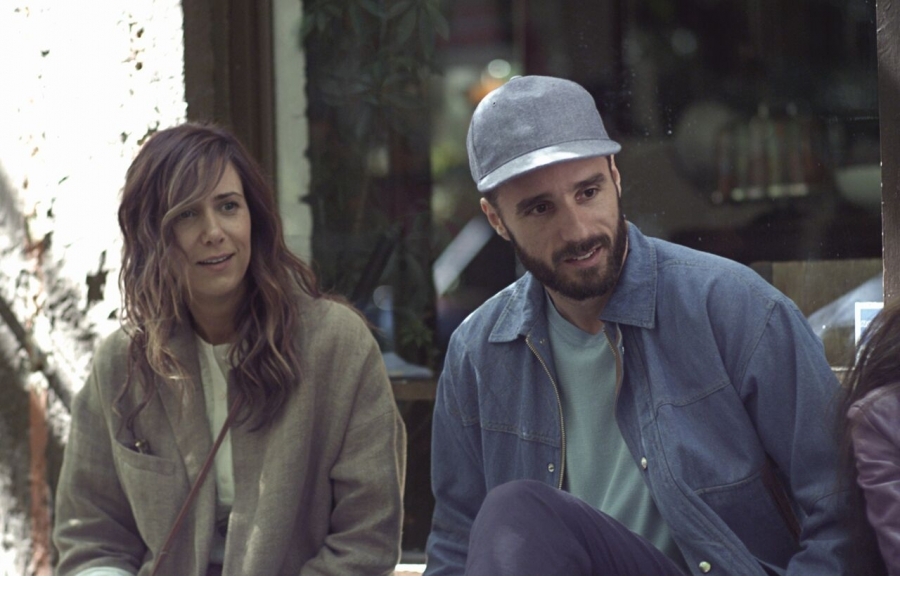“Nasty Baby,” opening Nov. 6 at The Roxy, is an intense and compelling drama about a gay couple — Freddy (out writer/director Sebastián Silva), an artist working on a “nasty baby” art project, and Mo (Tunde Adebimpe) — who live in Brooklyn. Freddy has agreed to help their best friend, Polly (Kristen Wiig), get pregnant. But when she has difficulty conceiving, Mo is asked to step in, which causes the friends some stress. Their lives are further disrupted by The Bishop (Reg E. Cathey), a neighborhood menace who harasses Polly, and spouts homophobic remarks at the men. As tensions escalate, the characters all face a difficult situation that tests their resilience.
Silva spoke to PGN about gay parenting and making “Nasty Baby.”
PGN: So, how did you come up with this story?
SS: It’s not autobiographical, but I drew on elements from my own life, and the neighborhood I live in. Everyone is reproducing compulsively, and the film is a bit about that and gentrification. The element of The Bishop comes from my experiences with an unpleasant neighbor I once had who was schizophrenic and violent.
PGN: Babies are naïve — literally. Freddy is a bit worldlier, but he acts in some infantile ways. Does he need to grow up? Is fatherhood his way of doing that?
SS: Don’t we all? He’s not a politician, nor a messiah. He’s a dude hanging out, following the lead of everyone else. Yeah, he needs to grow up. I didn’t conceive him to comment on his professional or psychological state — he could be a better artist — but his compulsion to have a kid. His guilt about reproduction is something he’s exorcising through his “nasty baby” video.
PGN: What can you say about the trend of gay parenting? Do you have an urge to procreate, or raise a child?
SS: For me, there’s no such thing as “gay parenting.” Gay terminology — what does it mean anymore? I’m not necessary against the word gay, but what does it represent? It’s parenting, not “gay parenting.” I would never be ready, to be responsible and committed. Are you ever ready? I don’t think I’m ready to raise a child. I have the curiosity, if not the urge. It would be a challenging step.
PGN: Why did you choose to star in this film?
SS: The confrontation with my neighbor was an in-joke I had with my boyfriend, so when it came to write this movie and put parenthood, gentrification and art together, it made sense for me to do it. Also, it has to do with finding a little more challenge in my work. Not that I’ve mastered moviemaking, but I’ve done a couple of films and acting in one would bring a level of difficulty I had not done before, and the fear of failure helped me be more aware of things. Now I’m happy to know that I can do that. I can’t play a pirate with an accent, but I can convey emotion successfully, and it was fun to do it and be successful. And I was the role of Freddy. Most of the dialogue was improvised. It was so easy, and inspired. It was not an easy movie to shoot, but we made it having fun, and a great collaboration.
PGN: What can you say about your approach to this film, which takes a very dark turn in the last act?
SS: I could never come to terms with the film’s ending and where I leave my characters and the audience. It’s very morally unsolved. I don’t want to understand it. I want to talk about it with everyone who has something to say. It’s more like an ending that opens a dialogue. It was an experiment, really. The turning point in the third act is meant to throw you off. It throws me off as the director. It’s a very manipulative film. I personally like when people play experiments and test me. When you leave the audience shaken, they forget what happened before the unexpected moment. That third act makes people forget this is a gay couple, and the varnish of homosexuality that people think this movie has, is completely washed away. That’s also a way to make people realize how important it is, and how personal. It’s not relevant that they are gay men.
